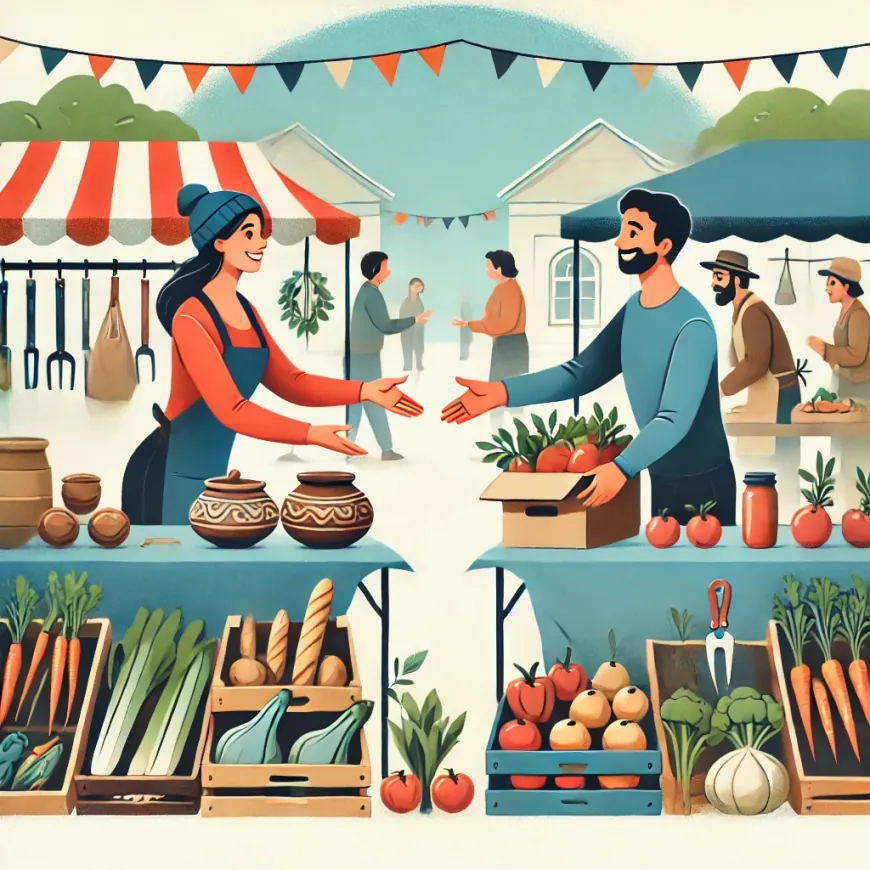Barter vs. Money: When is Bartering Better Than Buying?
barter exchange continues to be a practical alternative in many parts of the world, including India, offering distinct advantages over conventional monetary transactions.

The concept of exchanging goods and services without the use of money, also known as barter, has existed for centuries. In today’s digital age, where almost everything is bought with money, you might wonder whether the barter system still holds any relevance. Surprisingly, barter exchange continues to be a practical alternative in many parts of the world, including India, offering distinct advantages over conventional monetary transactions.
In this blog, we’ll explore when bartering is better than buying, how it benefits both individuals and businesses, and the current status of the barter system in India.
What is Barter?
Barter involves the direct exchange of goods and services without involving money. For example, if you have an abundance of rice but need clothing, you can trade your rice with someone who has excess clothes but requires food. It’s a simple, cash-free transaction where both parties benefit by fulfilling their needs.
Barter Exchange vs. Money-Based Transactions
In modern times, money is the most common medium of exchange. It’s efficient, universal, and allows for complex economic systems. But when does bartering offer more advantages than paying in cash? Let’s break it down.
1. When You Want to Save Cash
Sometimes, businesses or individuals face cash flow issues. In these situations, engaging in barter allows them to obtain necessary goods or services without spending money.
For example, in the barter exchange of India, many startups trade their services, such as marketing, web development, or office space, in exchange for products they need like equipment or raw materials. This helps conserve their limited funds, which can be used for other business-critical expenses.
2. When Cash is Unavailable
In areas where currency is scarce or where formal financial systems do not fully reach, bartering serves as a viable alternative. Rural communities often still rely on the barter system in India for day-to-day exchanges. For example, farmers may trade crops for tools or services in rural markets, reducing dependency on currency and allowing them to access goods without waiting for cash.
3. When You Want a Fair Trade
Bartering allows individuals to negotiate the value of their goods or services directly. In some cases, this can lead to a fairer deal than using money, which is subject to fluctuating prices or inflation. When both parties mutually agree on the trade, it creates a win-win situation where both sides feel they have gained value.
In local barter exchanges, such as those commonly found in India’s rural areas, people may feel more in control of the transaction, as they determine what is fair based on need rather than market price.
4. When You Want to Build Relationships
One of the key social benefits of bartering is that it builds relationships and strengthens community ties. Bartering is personal; it requires direct interaction and negotiation between parties. In India, small businesses or communities sometimes use barter as a way to forge stronger bonds and establish trust.
For instance, the barter exchange of India at community events or local markets encourages direct communication and cooperation. These exchanges can turn into long-lasting business or personal relationships, which is harder to achieve in a transactional, money-based economy.
How Barter Systems Are Evolving in India
India’s rich history with bartering dates back to ancient times when goods like grains, spices, and textiles were exchanged instead of money. Though the barter system in India has evolved, it remains an effective trading method in certain contexts, particularly in rural areas and among small businesses.
1. Rural Barter Systems
In many villages across India, barter is still a preferred form of trade. Farmers may exchange agricultural produce for tools, livestock, or even labor. This allows them to meet their needs without relying on cash, which may be difficult to obtain due to limited banking infrastructure in remote areas.
2. Barter Exchanges for Businesses
On a larger scale, formal barter exchanges have been established, offering a structured environment for businesses to trade goods and services. These exchanges provide a platform where companies can trade inventory, surplus stock, or professional services without using cash.
For example, organizations participating in barter exchanges in India can trade unsold products for marketing services or office supplies. This is particularly beneficial during economic slowdowns, when cash flow is tight.
Read More Blog:- The Ultimate Guide to Barter Exchange goods without involving money
When is Bartering Not Better Than Money?
While bartering has numerous advantages, it’s not always the best option. For instance:
-
Large or Complex Transactions: Bartering is often impractical for large, complex transactions where the value of goods or services can be difficult to match. In these cases, money is a more convenient and efficient medium.
-
Limited Matching Opportunities: Finding someone who needs what you offer and has what you need can be time-consuming and challenging. Unlike money, which has universal value, bartered goods are only valuable if the other party wants them.
-
Tax and Legal Issues: In many countries, including India, bartering is taxable. Determining the value of goods exchanged for tax purposes can add complexity to the process.
Conclusion: Is Bartering Better Than Buying?
Bartering offers unique benefits, particularly when cash is tight, unavailable, or you’re seeking a fair and direct trade. It encourages personal relationships, reduces dependency on money, and provides a viable alternative for businesses to exchange goods and services. In India, where the barter system remains active in rural areas and is gaining traction among startups and small businesses, it proves to be a flexible and efficient form of exchange.
However, it’s important to recognize that bartering is not always better than buying with money. For everyday transactions, large purchases, or when immediate liquidity is required, cash remains the more efficient and universal option.
Ultimately, the decision between bartering and buying depends on your circumstances, the scale of the transaction, and whether cash or a direct exchange of goods offers greater value. Whether you're looking to save money, build relationships, or simply try an alternative trade system, bartering still holds significant relevance, especially in today's diverse and evolving economy.
What's Your Reaction?
 Like
0
Like
0
 Dislike
0
Dislike
0
 Love
0
Love
0
 Funny
0
Funny
0
 Angry
0
Angry
0
 Sad
0
Sad
0
 Wow
0
Wow
0























































